| Article ID | Journal | Published Year | Pages | File Type |
|---|---|---|---|---|
| 4573471 | Geoderma | 2013 | 8 Pages |
•Biochar reduced NO3−–N and/or NH4+–N leaching from soils.•Biochar addition improved maize growth including biomass and root morphology.•Biochar increased N utilization efficiency, but reduced N accumulation efficiency.•Biochar could increase N retention and bioavailability in agricultural soils.
Interest in the use of biochar to improve soil productivity has rapidly increased. Nitrogen (N) loss, retention and bioavailability in biochar-amended soils fertilized with NH4+–N and NO3−–N were studied using leaching and pot experiments. NO3−–N leaching from the soils fertilized with NH4+–N and NO3−–N was significantly reduced by biochar addition. NH4+–N leaching from the NO3−–N fertilized soil was also significantly reduced by biochar, while no significant effect was observed for the NH4+–N fertilized soil. Also lower NH4+–N and NO3−–N were leached from NO3−–N fertilized soil with maize (Zea mays L.) grown. Mitigation of N leaching loss following biochar addition is mainly attributed to the increase in soil water holding capacity (WHC), NH4+ adsorption and enhanced N immobilization. Biochar addition stimulated maize growth, both above and below ground. Biochar also increased N utilization efficiency (NUE) of maize but decreased N accumulation efficiency (NAE), indicating that biochar addition may improve N bioavailability in agricultural soils. Therefore, reduction of N leaching, and increase of N retention and bioavailability in agricultural soils can potentially decrease the N fertilizer demand for crop growth.
